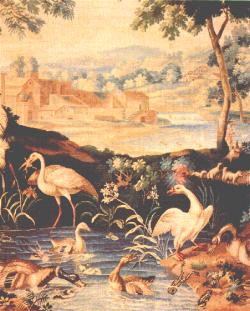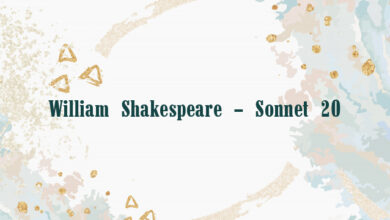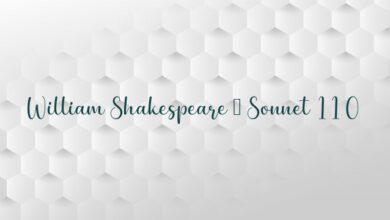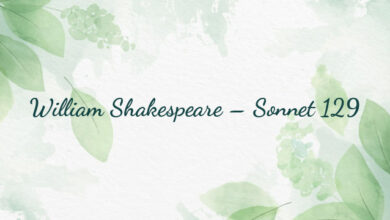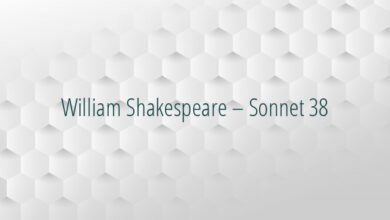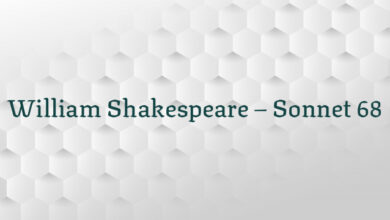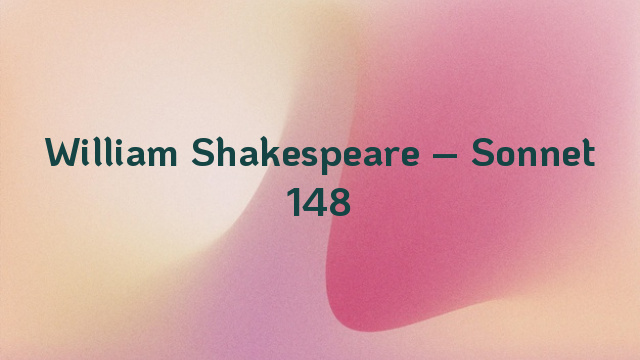
William Shakespeare – Sonnet 148
O me! what eyes hath Love put in my head,
Which have no correspondence with true sight;
Or, if they have, where is my judgment fled,
That censures falsely what they see aright?
If that be fair whereon my false eyes dote,
What means the world to say it is not so?
If it be not, then love doth well denote
Love’s eye is not so true as all men’s: no,
How can it? O! how can Love’s eye be true,
That is so vexed with watching and with tears?
No marvel then, though I mistake my view;
The sun itself sees not, till heaven clears.
O cunning Love! with tears thou keep’st me blind,
Lest eyes well-seeing thy foul faults should find.
�A somewhat disturbing sonnet which forms one of the group of four (147-50) in which the poet sees his love as a sort of raging fever, a madness in his blood, and he endeavours to come to terms with his own perplexity. There are probably hidden threads of reference in this group of poems which now can no longer be uncovered. The foulness with which he manages to end each of the four sonnets (blackness, foulness, defect, unworthiness) probably refers to her perceived unfaithfulness, but may also have implications of sexual voracity and/or disease, the French malady as it was called, a name which covered various sexually transmitted diseases, but more often referred to syphilis and its devastating effects. The sonnet may also be read as if it were part of a sequence complaining of a beloved mistress’s disdain, but given the content of some of the surrounding sonnets, (e.g. 142, 151, 152) it seems more probable that there are other hidden and more sinister meanings.
The 1609 Quarto Version
OMe ! what eyes hath loue put in my head,
Which haue no correſpondence with true ſight,
Or if they haue,where is my iudgement fled,
That cenſures falſely what they ſee aright ?
If that be faire whereon my falſe eyes dote,
What meanes the world to ſay it is not ſo?
If it be not,then loue doth well denote,
Loues eye is not ſo true as all mens:no,
How can it ? O how can loues eye be true,
That is ſo vext with watching and with teares?
No maruaile then though I miſtake my view,
The ſunne it ſelfe ſees not, till heauen cleeres.
O cunning loue,with teares thou keepſt me blinde,
Leaſt eyes well ſeeing thy foule faults ſhould finde.
Commentary
1. O me! what eyes hath Love put in my head,O me! – an exclamation of despair or sadness, equivalent to ‘Alas!’, as in 41 which deals with the youth taking the poet’s lover, probably the same dark lady as the one described here:
Ay me! but yet thou might’st my seat forbear,
And chide thy beauty and thy straying youth, 41.
Love = Venus or Cupid, usually the latter, who was often portrayed as a mischievous babe. In Astrophel and Stella Cupid takes up residence in Stella’s eyes, her hair, her lips etc. :
Cupid, because thou shin’st in Stella’s eyes,
That from her locks, thy day-nets, none scapes free,
That those lips swell, so full of thee they be,
That her sweet breath makes oft thy flames to rise,
That in her breast thy pap well sugared lies, A&S.12.
But also Love here refers to ‘the emotional experience of loving’ and to ‘the act of love’. In many ways the poem reads more easily if one takes the latter meaning at the outset and sees it as a meditation on sex, sexual intercourse, and sexual infatuation. The bawdy puns in 8-10 then become more relevant, and even the commonly held view of all men (all men’s no) that ‘Love’s eye is not true’ acquires the additional meaning that ‘the cunt is a betrayer’, a crude sort of folk wisdom among men from time immemorial. Overlaying all this is the classical myth that Cupid is blind and therefore obviously cannot see truly. The poem is operating on many levels at once, and no commentary can keep all these concurrent meanings active simultaneously, as one can do in reading it.
1-6. The poem opens with a succession of questions which may be also read as exclamations. The poet is both puzzled and amazed by what Love can do.2. Which have no correspondence with true sight;correspondence = agreement, concordance, matching relationship. Also communication, contact with (OED.5.a.).
true sight = that which the eyes would truly see if they were seeing correctly (if they had not been hijacked by love).3. Or, if they have, where is my judgment fled,if they have = if my eyes have true sight.
judgement = reason, good sense. As in the previous sonnet, where reason abandons him.4. That censures falsely what they see aright?censures = passes judgement on, evaluates (in this case falsely, erroneously). The modern meaning of ‘condemn’ was not in use at the time. Compare:
Censure me in your wisdom, and awake your senses, that you may the better judge. JC.III.2.16-17.
Note that this Julius Caesar example puns on the similar sounds of ‘sense’ and ‘censure’.
what they see aright = what my eyes see correctly. As in the other sonnets about eyes and heart or eyes and judgement such as 113-4, the psychology is uncertain. The dispute is set up between the eyes which claim to see the truth, and the heart, which claims otherwise, a poetic conceit which does not necessarily have to conform to any pre-ordained ideas of mental functioning.5. If that be fair whereon my false eyes dote,fair – as in the previous sonnet, fair has its usual meanings of ‘blonde, bright, good, just, beautiful’. The eyes can only pick out what is external and physically fair, but they do no see into the heart.
dote – the word most commonly used to describe a besotted infatuation. Compare 113 on a similar theme
Who in despite of view is pleased to dote;6. What means the world to say it is not so?it is not so = i.e that you are not as fair as my eyes or my mind indicate.7. If it be not, then love doth well denoteIf it be not = if it is not so; if it is not as I believe it to be. The phrase simply takes up the ending of the previous line.
love doth well denote = (my) love for you amply demonstrates. However these two lines, 7-8, may be read in a number of ways. This depends partly on punctuation, but the meanings are more seriously affected by the loose syntax, the fact that ‘love’ occurs twice, possibly with the same meaning, possibly not, and by the floating ‘no’ at the end of line 8. denote probably means ‘shows, demonstrates’, and the approximate meaning of the two lines would be ‘Love, the experience and passion of love, amply demonstrates that lovers’ ways of seeing are not the same as all men’s. Clearly not.’ An alternative meaning is ‘………Cupid shows that his way of seeing things is not the same as men’s’. Finally, taking no as being the exclamation that men make to contradict his (the poet’s) judgement, it could be ‘my experience of love shows that Love compels me to see things opposite to all men’s denial of her beauty’.8. Love’s eye is not so true as all men’s: no,
Love’s eye – see the note above for the meaning of this line. The phrase ‘love’s eye also had a bawdy meaning of ‘vulva’ or ‘female genitalia’. See Partridge p.109, under ‘eye’. The idea is probably developed further in lines 13-14, when the poet hints that he is blinded by his sexual infatuation. Also one can perhaps see a connection with the previous sonnet and the possible references to venereal disease, which might well produce watching as a result of pain, and tears in the form of fluxes and discharges (line 10). A pun may also be intended on aye, ‘love’s yes’, a consent or non-consent to have sex. Compare Wyatts poem asking the lady to answer yea or nay, given with sonnet 137.
all men’s: no, – the punctuation given is that of Q. See the note to the line above for interpretations. It could be read as “All men’s ‘No!'”, i.e. the general repudiation of her fairness, or her truth. Or it could be an exclamation standing more or less alone and linking to the following line, ‘No! How can it?!’ The punctuation cannot be taken as decisive, and various meanings were doubtless intended to be conveyed. all men’s no is probably a slang expression for the penis.9. How can it? O! how can Love’s eye be true,
O! – this may be a deliberate echo of all men’s no and invites one to think of women’s O as in the folk poem
Childrens Ahs and Womens Ohs
Doe a wondrous griefe disclose;
which is given in full with sonnet 135. Partridge links eye to O in his gloss of the bawdy meaning of eye. See Partridge p.109 and SB. p.521.10. That is so vexed with watching and with tears?vexed with watching and with tears = disturbed, aggravated by staying awake and by weeping. Watching and weeping were traditional attributes of the besotted lover. The idea is used in 41, when the poet tells of his love weariness:
It is my love that keeps mine eye awake;
Mine own true love that doth my rest defeat,
To play the watchman ever for thy sake: 41.
The marks of a lover are given by Speed, the clown servant, in Two Gentlemen of Verona:
Val. Why, how know you that I am in love?
Speed. Marry, by these special marks: first, you have
learned, like Sir Proteus, to wreathe your arms,
like a malcontent; to relish a love-song, like a
robin-redbreast; to walk alone, like one that had
the pestilence; to sigh, like a school-boy that had
lost his A B C; to weep, like a young wench that had
buried her grandam; to fast, like one that takes
diet; to watch like one that fears robbing; to
speak puling, like a beggar at Hallowmas. TGV.II.1.16-25.
Weeping and watching were evidently part of the ritual of loving, or at least part of the way in which it was described. See also the note above to line 8. The tears may also hint at less pleasant experiences, as for example mentioned in 119:
What potions have I drunk of Siren tears,
Distill’d from limbecks foul as hell within, 119.
Or possibly sexual pleasure is hinted at and the hunger for more. Despite the description given by Speed above, weeping does not feature all that often in sonnets of the period, perhaps because it was considered too unmanly. William Smith describes oceans of weeping:
But my love’s sea, which never limit keepeth,
Which never ebbs, but always ever floweth,
In liquid salt unto my Chloris weepeth; Chl.30.(1596).
Barnabe Barnes (1593) amongst his almost interminable plaints to his mistress speaks more often of weeping. One of his Elegies begins:
Behold these tears, my love’s true tribute payment! P&P.El.6.
In another he is blinded with tears:
Ah then! even then, in spirit crucified,
Mine eyes with tears, mine heart with sighs and throbs;
Those almost blind! that, hard swollen, almost burst! P&P.El.14.
And Griffin in Fidessa (1596) enjoins himself to weep no more:
Weep now no more mine eyes, but be you drowned
In your own tears, so many years distilled! Fid.30.
Sidney mostly speaks of Cupid weeping, or Stella, rarely himself, although he does occasionally mention his own tears:
Oft with true sighs, oft with uncalled tears,
Now with slow words, now with dumb eloquence
I Stella’s eyes assail, invade her ears; A&S.61.
We cannot know for certain therefore whether Shakespeare is parodying these probably earlier poems, or using the convention for its own sake, or introducing the idea of weeping and tears to cast dark hints on his mistress’s sexual proclivities and her possibly diseased state.11. No marvel then, though I mistake my view;No marvel then = it is then no wonder
though I mistake my view = that I misinterpret, that I am mistaken in what I think I see. though in this context implies ‘even though’.12. The sun itself sees not, till heaven clears.
Perhaps a nostalgic echo of
Yet him for this my love no whit disdaineth;
Suns of the world may stain when heaven’s sun staineth. 33.13. O cunning Love! with tears thou keep’st me blind,O cunning Love! – a complex bawdy pun, using O (women’s Ohs), cunning (skilful in love, cunt-knowing, cunt-chasing), and Love (making love) to react with the surface meaning of ‘all-knowing, ingenious Cupid’. However the meaning of Love also merges into that of ‘love itself (Cupid, Venus, abstract love)’, ‘my love for you’, and ‘you, the beloved’, the poet’s mistress, since she is the one accused of being ‘foul’ in the next line. The fact that Cupid was blind meant that he desired others to be the same, but he himself was gifted with a second sight, and was a God.14. Lest eyes well-seeing thy foul faults should find.eyes well-seeing = healthy eyes seeing without fault and impediment. thy foul faults = your crimes, your foul diseases. Evidently Love in the line above is no longer Cupid, or the passion of love, but the dark lady herself. foul could possibly be a noun, meaning ‘foulness’, and the line would then be read as ‘Lest eyes seeing your foulness would then inevitably find faults in you’.
